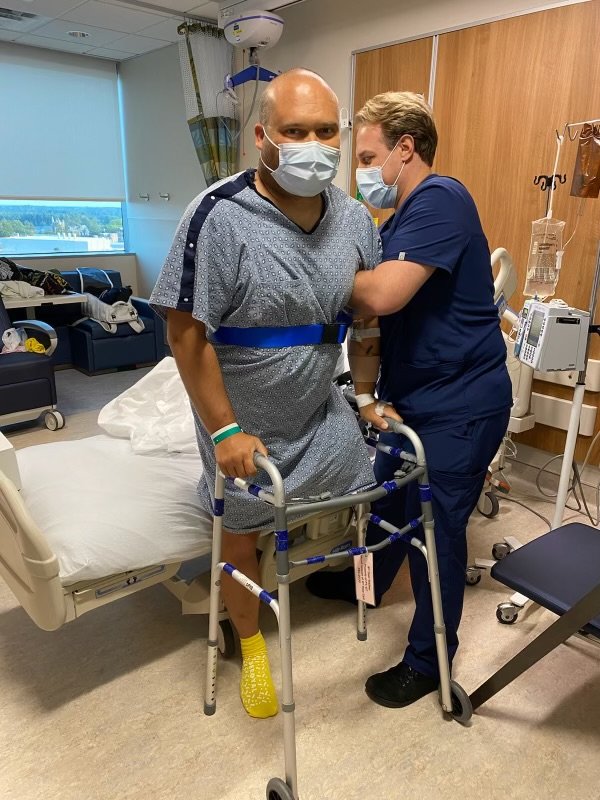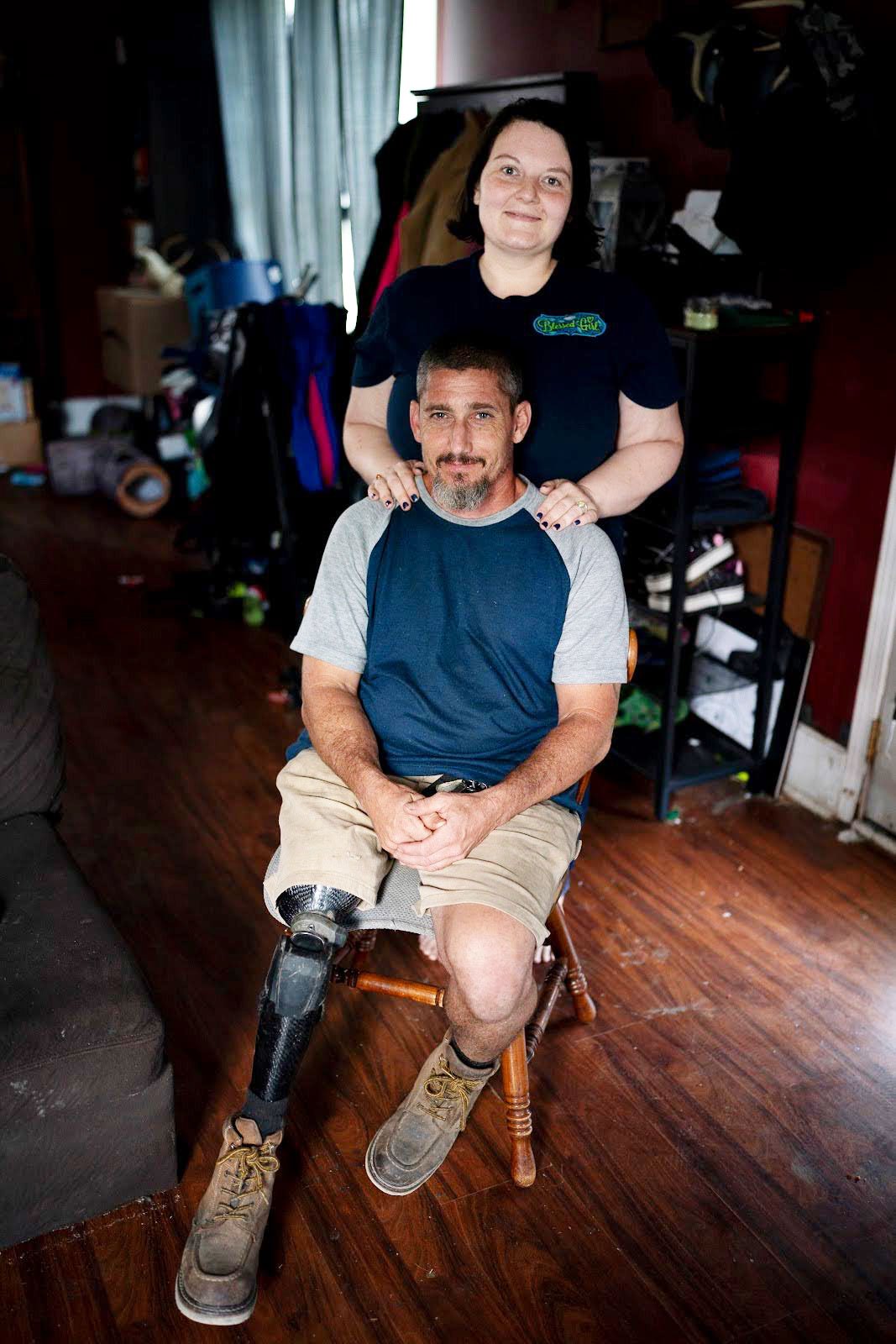New Bill Raises Hope for Amputee Veterans Craving Active Lifestyle Congresswoman credits War Horse report for exposing VA barriers to prosthetics and treatment that critically disabled vets need ‘to live life to the fullest.’
It took nearly two years of badgering for the Department of Veterans Affairs to approve amputee veteran Matt Brown’s prosthetic leg socket specialized for jiujitsu. It took only three months of practicing his cherished martial art for Brown to lose 18 pounds and regain a sense of himself.
Now, a key lawmaker on the House Veterans Affairs Committee has introduced a bill to make sure amputee veterans like Brown won’t face so many barriers to getting prosthetics for activities—from running and swimming to yard work—that most people take for granted.
The proposal from Rep. Mariannette Miller-Meeks, an Iowa Republican, came one month after The War Horse published a story focusing on Brown and two other amputee veterans in their 40s who expressed frustration over bureaucracy and gaps in care they received from VA.
“The War Horse’s story underscores how important it is to ensure that critically disabled veterans have the tools they need to live active lifestyles as they please, to live life to the fullest,” Miller-Meeks, who chairs the House Veterans Affairs Subcommittee on Health, said in a statement.

Bone cancer claimed Army parachute rigger Matt Brown’s left leg after he served for years at Fort Liberty, North Carolina. (Photo courtesy of Matt Brown)
Miller-Meeks said she and her staff have heard from veterans and advocates about a frustrating loophole in the VA’s current guidelines that “does not recognize adaptive sports and recreation prosthetics limbs as clinically necessary for veterans living with limb loss.”
The Veterans Supporting Prosthetics and Recreational Therapy (SPORT) Act would add “adaptive prostheses and terminal devices for sports and other recreational activities” to the statute governing which equipment and aids the Department of Veterans Affairs is allowed to grant vets.
Advocates for amputees said VA is more focused on serving older, more sedentary veterans than caring for younger ones injured during the post-9/11 wars and still in the prime of their lives.
They also highlighted a 2017 VA rule that links eligibility for spare prosthetics and home exercise equipment to “medical treatment and rehabilitation,” emphasizing that the “comfort or convenience of the veteran” was not on its own a sufficient reason.
The bill was one of 16 pieces of new and draft legislation discussed at a Sept. 11 hearing before the subcommittee on veterans’ health. It moves next to the full House Committee on Veterans Affairs and is sure to face some pushback.
Ajit Pai, VA’s executive director for Rehabilitation and Prosthetic Services, told lawmakers that the department saw Miller-Meeks’ bill as “redundant,” hinting at concerns that it would create space for the purchase of pricey equipment for veterans that never gets used.
While the Congressional Budget Office has yet to generate a cost estimate for the bill, specialized prosthetics are expensive. Running legs can cost north of $20,000, while swimming prosthetics start at several thousand dollars. A 2020 GAO report found Veterans Health Administration spending on prosthetics, under current guidelines, added up to $15.4 billion between 2015 and 2019.
Award-Winning Journalism in Your Inbox
“What we see is that the rehabilitation for this type of journey can take even longer than just that initial phase,” Pai said, “and so we really want to make sure that a veteran has consistent and constant participation in that activity so they can really benefit from that lifelong care.”
But Clark Pennington, chief operating officer of The Independence Fund, a nonprofit serving catastrophically wounded veterans, told lawmakers that “a significant population” of amputee veterans was having trouble getting access to recreational prosthetics, including two veterans trying to obtain prosthetic blade attachments for swimming. The lack of access to this connection to their former life, he said, was “a significant mental health barrier.”
In an interview with The War Horse days before the hearing, Pennington emphasized the VA’s many initiatives focused on helping all veterans become more active for their physical and mental health. An active lifestyle for veterans with limb loss, he said, should be just as much of a priority.
Exercise is “necessary for their health; it’s necessary for longevity of life and controlling those other ailments that come from being sedentary and not being able to exercise,” he said. “Most of our veterans [who] join the military are exercise focused, and not having that opportunity to do that does restrict their wellbeing.”

Lelia and Scott Restivo are hopeful the new legislation will standardize and speed up the process for approving treatment and equipment for amputee vets. Restivo, an Army veteran who served three tours of duty in Iraq and Afghanistan, is dealing with post traumatic stress, a traumatic brain injury and an ill-fitting prosthetic leg. (Photo by Denny Simmons/The Tennessean)
The War Horse’s story in August also highlighted the struggles of Scott Restivo, an Army veteran who lost his right leg in 2018 to sepsis linked to training and deployment injuries. He said he still lacks a prosthetic leg that allows him to walk without discomfort, let alone run as he’d like to do.
His wife, Lelia Restivo, said in an interview this month that they are now requesting the latest version of the Ottobock Genium leg, a top-of-the-line prosthetic that can retail for more than $100,000, in hopes that it would allow Scott to walk and run in comfort, but they are still waiting for a response from VA.
Her husband “just wants to be able to run again, and have the running leg,” Lelia said. He isn’t saying he wants “to join the Paralympics or run 50 miles a day. He’s saying, ‘I just want to be able to enjoy my life and my health.’”
Lelia Restivo said she hoped the new legislation would “at least give structure to the guidelines” for VA to follow for granting prosthetics and other equipment to veterans.
Brown, an Army vet who lost his leg in 2021 to bone cancer, sees his experiences as a testament to the value that prosthetics for recreation can add to the lives of severely injured veterans. Back on the mat every week practicing jiujitsu, he is aiming to be down another 12 pounds by Christmas.
“He’s saying, ‘I just want to be able to enjoy my life and my health.”
— Lelia Restivo, speaking about her husband Army veteran Scott Restivo’s request to get a new high-end prosthetic
He has little patience for a system that dictates what equipment amputees need to live full lives, particularly those who put their bodies on the line to serve their country. Brown was furious last year after a contractor confiscated a specialized ankle joint from his prosthetic leg during a routine maintenance appointment over a dispute with VA. He got it back, but not before he expressed his outrage on social media.
Paying the bill for this equipment, he believes, is what the U.S. government agreed to when it sent them to fight the nation’s battles.
“There’s no such thing as recreational prosthetics,” Brown said. “It’s just prosthetics for enabling what everyone else gets to enjoy as normal life.”
This War Horse impact story was reported by Hope Hodge Seck, edited by Mike Frankel, fact-checked by Jess Rohan, and copy-edited by Mitchell Hansen-Dewar. Coverage of veterans’ health made possible in part by a grant from the A-Mark Foundation.





Comments are closed.